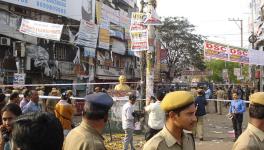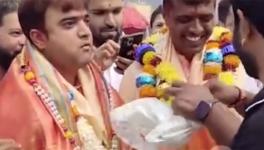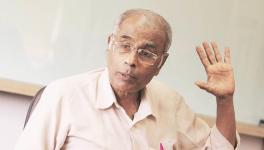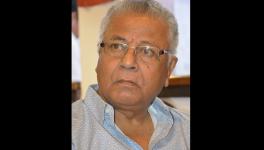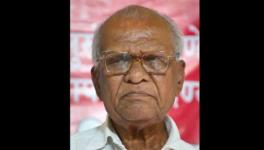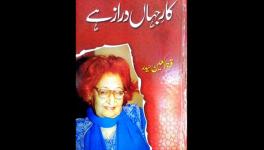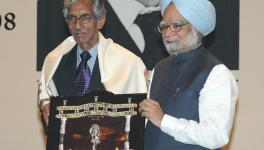Jnanpith Award to Damodar Mauzo and Right-Wing Extremism
This year’s Jnanpith Award for best literature has gone to Damodar Mauzo, the famous Konkani novelist and short story writer. The great Assamese poetic talent, Nilmani Phookan Jr, has also been awarded the Jnanpith for 2020. Hopefully, as we celebrate “their outstanding contribution towards literature,” our discussions will not remain confined to the literary domain.
In his acclaimed novel, ‘Karmelin’ (1980), Mauzo writes about the abuse of women who go to work as housemaids in the Middle East. This novel came long before everybody started talking about this issue. His story, ‘The Burger’, is about two school friends, Irene and Sharmila, and the guilt little Irene experiences over ‘polluting’ Sharmila with a beef burger. Another story describes how cow vigilantes intimidated a Dalit youth long before others talked about the phenomenon.
Maybe Mauzo could see beyond the immediate and obvious, which prompted his social and political actions on issues of concern to all of society. That social engagement allowed him to observe the dangers that lurked in our society in the form of the right-wing, and gave him courage to never shy away from boldly speaking out against them.
Recall the stand Mauzo took after the assassination of rationalist MM Kalburgi in 2015 for freedom of expression. In a letter to the Sahitya Akademi chief, he said the literary figures must stand up to suppression and condemned the “moral policing by the protagonists of mono-culturism”. His speech in January 2016 at a seminar in Dandi, Gujarat, also critiqued the Sanatan Sanstha in no uncertain terms, despite threats. He then appealed to citizens on the eve of the 2019 Lok Sabha elections to “defeat the fascist regime”.
In Goa, the Sanatan Sanstha and the Hindu Janajagruti Samiti are well known. For over a decade, their activities have come under the scanner for allegedly espousing and participating in right-wing extremism. Even the political patronage they have continued to receive is well known.
We later discovered that such organisations had put Mauzo on their hit list for his principled opposition to right-wing extremism. When the Karnataka Anti-Terrorism Squad investigated the assassination of journalist-activist Gauri Lankesh, a leading voice against communalism, it arrested around a dozen alleged associates of these organisations. It discovered these extremists had a ‘hit list’ of scholars, activists and social workers including Lankesh, the late Girish Karnad, the rationalist Kannada writer-translator KS Bhagwan, journalist Nikhil Wagle, Mauzo, and others.
This discovery has not deterred Mauzo from speaking his mind against right-wing extremism. Nor did it stop others. Wagle, for example, asked after the list was discovered, “If the government of India can ban SIMI [Students Islamic Movement of India] or Zakir Naik’s organisations, what stops them from banning Hindutva extremist groups? Does the organisation enjoy impunity because it is a Hindu group?”
Like many others on this ‘hit list’, Mauzo has round-the-clock police protection although he did not want it. The shock that death squads have hit lists in India may have dissipated with time. Still, the very idea that violent or militant groups can target writers, intellectuals, and activists working to build a better world can get targeted is a threat to society.
Majoritarianism may keep getting normalised in our country, so we must not underplay the gravity of the situation. Doing so will be at our peril. The deterioration of our social fabric with the advent of aggressive majoritarianism is evident in the recent attempts in Gurgaon, Haryana, to even stop Muslims from offering prayers. We see that the police and elected representatives either cannot control the rowdyism of the right-wing or openly support it.
The picture is very murky, for, allegedly, some activists or sympathisers of outfits such as Sanatan Sanstha were involved in a plot to carry out blasts in Mumbai, Pune, Satara and Nalasopara (Mumbai), in Maharashtra. Bombs, gelatin sticks, detonators, a mysterious white powder wrapped in newspaper, and other items were reportedly recovered from the home of Vaibhav Raut in Nalasopara (and from his other associates) by the Maharashtra Anti-Terrorism Squad (ATS).
It is alarming that they dared to plan out such activities around Independence Day, Eid and the Maratha agitation. However, it was not for the first time. In 2006, these organisations had hit the national headlines when Panvel and Thane in Maharashtra witnessed bomb blasts. Islamist militants were blamed for these blasts. Around this time, police officer Hemant Karkare had taken over as chief of the Maharashtra ATS. After a thorough investigation, he had recommended banning these right-wing organisations.
The ATS had found Mangesh Nikam, Haribhau Divekar, and others involved in these violent acts, though as mere foot-soldiers. In 2009, two alleged activists of these organisations Malgonda Patil and Yogesh Naik, died while reportedly transporting a bomb on their scooter. It was said they were ferrying the bomb to the popular Narkasur festival. Many innocents would have been killed if Patil and his associate had succefseded. The Sanatan Sanstha had been campaigning against the Narkasur festival, which they felt “glorified evil”.
Later, the Sanatan Sanstha denied its association with the dead activists. However, Dr Narendra Dabholkar had asked at the time: “How is it that the Sanstha’s activists so often take to the same kind of ‘wrong path’... how is it that this unconvincing argument is accepted at face value and the Sanstha gets away...? It also defies belief that a few rogue activists of the Sanatan Sanstha, a tight-knit, secretive organisation, independently carried out the blasts without the knowledge or involvement of any of the senior persons in the organisation.”
Reportedly, in 2012, the Sanathan Sanstha started the All Indian Hindu Convention “for establishment of Hindu Rashtra”, which became an annual event. And just six months back, it was in the news when Facebook banned it for violating its content policies. [However, it retained most of its pages online for months.] The hiatus between the decision to ban the Sanathan Sanstha and the non-implementation of the ban was attributed to political pressure.
Perhaps what Mauzo said in his speech at the Sahitya Akademi Festival of Letters is worth recollecting. He noted how our silence goes from tame acceptance to emboldening the right-wing. It is a silence we need to break, remembering that every voice counts.
The author is an independent journalist. The views are personal.
Get the latest reports & analysis with people's perspective on Protests, movements & deep analytical videos, discussions of the current affairs in your Telegram app. Subscribe to NewsClick's Telegram channel & get Real-Time updates on stories, as they get published on our website.









